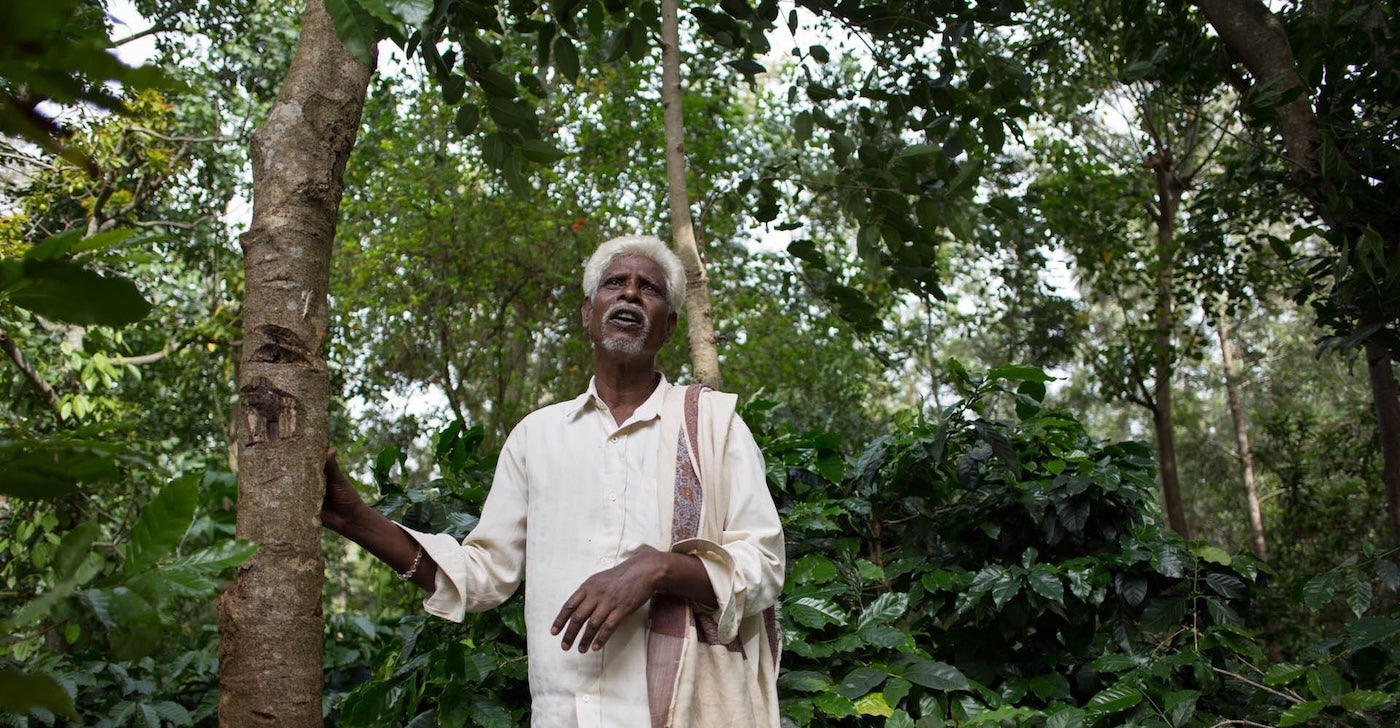The first episode of Coffee Grounds is a despatch from the village of Yerakanagadde, nestled in the Biligirirangana Hills in southern Karnataka. It is part of a small cluster of resettled communities who traditionally have lived as hunter-gatherers in these forests, now protected under the Biligiri Rangaswamy Tiger Reserve. Until now the hills were known for these indigenous people — the Soligas — a deity who wears oversized sandals, and leopards. But now, there is also coffee.
Words by Arshiya Bose | Photography by Vivek Muthuramalingam


The first thing that caught my attention about Achukkegowda was his striking silver hair. It was impossible not to notice, and I constantly found myself eyeing it with envy — it would seem I have an unfounded penchant for white hair! I sat down clumsily on his porch and and fished out my notebook and pencil.
The second thing that caught me off guard was something he said, something I had assumed tangentially but hadn’t dwelled upon before with consideration. He said that he was born in the forest and had lived inside it for six years with his parents, foraging wild vegetables which the forest had in plenty. It took me a moment or few to think about the words that he had strung together — born in the forest, lived in the forest with his parents, collected forest foods. It took me a few more moments to imagine how one might passage from that sort of unbound lifestyle into one with a permanent roof, houses in neat rows and a farm full of coffee plants.
He said that he was born in the forest and had lived inside for six years with his parents, foraging wild vegetables which the forest had in plenty.

Achukkegowda is now 67 years old. He planted his first coffee bush in the early 1990s; today, coffee is what earns him his livelihood. He started cultivating coffee only after his family was forcibly settled in podus(hamlets) and because of the constant ravaging of their ragi and jowar fields by elephants and wild boar. A village elder suggested that he try growing a crop that wildlife wouldn’t eat and soon thereafter he became one of the first Soligas to plant coffee (first the Cauvery variety of Arabica and then Selection 9) — although there were already larger coffee estates in the region.
Unexpectedly, many Soliga landholders collected their first stock of coffee plants not from Forest Department nurseries or the Coffee Board but from saplings found on the edges of the larger estates, presumably beans chewed and carried out by civets and other wildlife. The Soliga coffee gardens lie peppered amidst and across these larger estates and the forest. Many Soligas (although not Achukkegowda) are jeeped off to the estates in the morning where their duties include meticulous pruning, weeding, spraying pesticides and berry picking (depending on the season). Soliga homesteads, and here Achukkegowda’s farm is not unusual, are much more spontaneously managed — if pesky beetles are spotted then the stem of the plant is chopped, the poop of loitering goats is piled up at the base of coffee plants. The result: coffee plants are eccentric, and yields are low and discordant with patterns observed in most other coffee-growing districts in India. Contrary to my romantic, untroubled notions of how coffee came to be across southern India, coffee history in the BR Hills has a rather bittersweet beginning. Coffee-growing was seen as a necessity, or the most sober choice amidst the lack of.

I could sense a lament for the fading wisdom that his community had been nurturing over centuries through their intimate relationship with the forest.
As I caught myself drifting, Achukkegowda was describing ‘taragu benki’, or litter fire. His voice turned louder and stronger, and he threw his hands in the air as he talked about how the traditional Soliga way of fire control had been brushed aside by the forest department. Small, controlled fires can hold down larger forest fires and manage the spread of weeds, perhaps even of lantana, he said animatedly. I could sense a lament for the fading wisdom that his community had been nurturing over centuries through their intimate relationship with the forest.
I drifted off again back to our drive into the BRT Wildlife Sanctuary. The forest looked dense to anybody who might not have spent time in a forest in southern India but I knew that most of this thick, dense vegetation was just lantana. ATREE’s (Ashoka Trust for Research in Ecology and the Environment) research over the past decade suggests that this ornamental but exotic weed has taken over as much as 80 percent of BRT, smothering native grasses.

According to many of the Soliga people, the proliferation of lantana has made the forest so impenetrable that that animals are deprived food and space. Elephants too are unable to walk through thorny lantana thickets and instead prefer main roads and of course on occasion, crop fields.
I remember Achukkegowda vividly from our first encounter in November 2015. I had requested a meeting with some Soliga landholders to discuss whether they felt the need for an organisation like Black Baza Coffee. I was very nervous with only one real shot — a flask of pure Robusta cherry brewed crudely in a steel filter. I say crudely because the field station filter is so temperamental that one is forced into committing unspeakable actions like double filtering or half-filtering and then sieving through a handkerchief. I knew my Kannada would stand out like broken wood splinters, but I was hoping my overeager puppy, glazed look would be sufficient to transcend linguistic hurdles. Twelve Soliga men (no women came) sat down in a circle on the floor of the meeting hall. Coffee was poured into steel tumblers. Parle G was passed around in a tray. The twelve men sipped. There was some muted muttering and then reaching out for the sugar jar in unison. “Very strong coffee,” K. Mahadeva said. Bedegowda agreed, “Very strong and bitter”. Achukkegowda drank his coffee rather stoically. And only I went back for refills.
“How is our Soliga coffee selling?” and I am tugged back into the now. It’s doing very well, I say. The out-turns are sizable, and comparable to many well-organised coffee estates. He seems distracted. “When there was a lot of forest we used to sell whatever lichen, amla and honey to a merchant in Kerala. Now there is only lantana and coffee.”
I have met Achukkegowda on numerous occasions since 2015. One conversation snowballed into thirty and so it goes when you’re a first-timer in the field with a fondness for discursive dialogue. In typical narcissistic fashion however, understanding his relationship to coffee and the forest has been a jaunt into my own moral philosophy. I am guilty of wafting off during conversations both in BR Hills and back home in Bangalore gathering wool about passaging from one way of life to another, negotiating modernity and coping with change. And any conclusion just yet is too abrupt.




